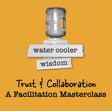Facilitating Meetings: Managing Personalities and Engagement
00:00:11
Speaker
Facilitating a meeting can be a daunting task, managing diverse personalities, keeping everyone engaged, and steering the discussion toward productive outcomes. It's no wonder that many facilitators face challenges that lead them feeling overwhelmed. In today's episode of Water Cooler Wisdom, Rachel and I are addressing these very challenges. We'll dive into the most common obstacles facilitators encounter when facing difficult personalities and offer practical solutions to help you manage them.
Introduction: Water Cooler Wisdom on Facilitation
00:00:43
Speaker
Hello and welcome to another episode of Water Cooler Wisdom. I am Jake Blocker. And I am Rachel Grail. Rachel, great to see you again. Yep, always happy to be here. Yeah, happy Monday or whatever day it is that you are listening to this. Yeah, and it's just our little core team today.
00:01:00
Speaker
Yes. Yeah. It's just the two of us very different. Yeah. We're, we're doing something a little bit different. You know, we've done Q and a format in the past. Um, for listeners who may not have heard this in the past, we, we have a ton of webinars. Check me out on our website, interaction, associates.com little plug.
00:01:16
Speaker
Good plug. We do a lot of webinars with lot of
Masterclass Insights: Effective Facilitation Techniques
00:01:20
Speaker
webinars. We often ask people to submit questions, and we get a ton of them. And recently, we did one on facilitation, facilitation masterclass, and received a e ton of questions. Yay, we love the questions. Yeah, they're amazing questions too, really, really good ones, and insightful questions. And we've got questions you know in the facilitation realm from some past webinars. So we thought, you know what? It's a good idea to tackle some of these questions because we can't get to them all. There are so many that maybe this is a way we can you know sort through them a little bit easier. So that's what we're doing today. This is just straight up a Q and a of sorts where we have our master facilitator here, Rachel, who is going to be answering some of these burning questions.
Facilitation as an Art: Curiosity and Group Needs
00:02:06
Speaker
Yeah, and I'll do my best to share what I know, what I've learned from my years of study and practice. And a little caveat is that there are lots of people who do this in different ways. So take what you can from me, but keep asking questions to everyone and anyone you can because I'll share my perspective and there are other valid um tips and tricks out there from others as well.
00:02:32
Speaker
That's great. Thank you very much, Rachel. You ready to get started? Yeah, I do have one more little key thought that I want to kind of sort set up with because this is a new format and we are talking about facilitation. um I want to share as well that we'll give you some some tools, some frameworks. We have a ton in our in our resource kit, but this isn't meant to be purely prescriptive. Facilitation is really more an art than a science. And like art, you can learn techniques and apply them that will make your outcomes more successful, but really the most important thing you can do is just learn to stay curious. So attention and interest should be outward. What's happening with the group? What do they need right now?
00:03:19
Speaker
Where are we trying to go as a team? How can I bring us there together? I find the quickest way to get derailed is when I focus too much on my own performance. Like, am I doing a good job? Am I being impressive?
Mindfulness in Facilitation: Managing Performance Anxiety
00:03:32
Speaker
yeah ah So it takes some inner work to get to the place where there's enough peace in your own mind to just focus on the group.
00:03:42
Speaker
And um this episode isn't about the inner work. We have some other great episodes on mindfulness and and things like that. And I will leave that up to you. If you have questions about that, you can send them to us and we'll address them. But I like to mention that inner work piece.
00:03:59
Speaker
It should be on your radar ah because facilitating a group is is vulnerable and it's not you can't plan for everything that happens. And in fact, today we're going to be talking about what are some of the difficult behaviors that come up that might make you feel a little bit stressed and pressed.
00:04:17
Speaker
So we're going to be talking about the outer work, like the tools, the techniques, the things you can apply.
Preparation and Focus: Keys to Successful Facilitation
00:04:23
Speaker
And and they can really help you feel more calm and at peace. But ultimately, you have to kind of be prepared to know like, OK, here I go. I'm going to do my best. I'm going to make it about them and not about me. And that's the way that's kind of the the baseline to be really successful. So I wanted to set that up as well.
00:04:42
Speaker
I love that. Actually, I feel like there's almost a callback to one of our previous episodes with Stacy, Stacy Ferrari on when she was talking about, you know, focusing on the group, not yourself, exactly getting over that public speaking is, you know, it's about the group. It's not about yourself. Stop thinking about yourself.
00:04:57
Speaker
Yeah, and it's such ah it's such a hard thing to switch our our minds around to do that because we do feel vulnerable. And oftentimes we are facilitating in a work environment where it is important not to you know look like a moron, but also the that it's kind of paradoxical because the the way you can be most successful is not worrying about being
Techniques for Managing Dominant Voices in Meetings
00:05:21
Speaker
successful. So um that takes some that takes some practice and it takes some self-awareness. So however you like to get into a place of self-awareness, I recommend it. Today we're going to talk about what are some of the tech tips and techniques that can um ah help you just have what you need in your back pocket to keep the group moving forward in a positive, productive, inclusive way.
00:05:48
Speaker
That's awesome. Yeah. yeah Rachel, is as, as you mentioned this episode, we're going to, for facilitation techniques, we will be focusing on balancing dynamics and managing difficult situations. So let's get into it. So question one, uh, so how, how do you mute the dominant voices to give others a chance to speak up? It's very common.
00:06:12
Speaker
Oh gosh, I love that we're starting with this because it is, I get it every single time I'm doing a training. People are like, what do I do when someone's dominating the conversation? um So you're gonna probably hear me talk a lot about preventions and interventions. So preventions are the things that you do before or even during ah a facilitative um opportunity where you you set things up. Here's the process for how we're gonna do things. So if you know that you have a few dominant, ah potentially dominant voices in the group, or even if you don't, it's really helpful to set up a process for contributing.
00:06:48
Speaker
OK, we're going to go around Robin or um some people say take three, make three. So you speak for three minutes and then you wait for three minutes before you speak again. So I think
Ensuring Balanced Participation: Structures and Reflection
00:07:01
Speaker
setting up a process is is the first tip.
00:07:04
Speaker
I think the other thing that's really helpful is making sure that everyone in the group understands why others are there, what their expertise is, what their perspective is. um People understand, hopefully, well why they are there and they have their subject matter expertise, but it can help to understand um what the perspectives of the other are so that people get kind of curious, like, oh, I want to hear from that person.
00:07:30
Speaker
Another thing that can happen with this is that sometimes people keep talking because they're not feeling hurt. So they keep repeating themselves, they're going over and over. So we have a bunch of listening skills that can demonstrate to people That they're being heard reflecting their words back to them paraphrasing what they say Making sure that their points are captured in a group memory. They can see their words like okay here. I've been heard so I think that's a really effective thing to do and then Lastly just kind of a basic
00:08:06
Speaker
overarching theme is you want to think about how do I escalate my level of of intervention with this person? So I want to use the least amount of force as I can um to be to be effective. So you can start by saying something like, okay, I'd like to hear from those I haven't heard from yet. and But all the way up to like a lot of times, people just keep talking and you don't know when you're gonna get a word in edgewise and you start thinking, oh my goodness, this person's gone on and on and on. and And so how do you interrupt without shutting them down? This is the question, we wanna validate
00:08:49
Speaker
everyone in our group, even the people who are dominating. So um I would say that if someone just keeps talking, one of the ways that you can interrupt tactfully is to say, i want to I want to jump in here. Not because what you have to say isn't important, but you're making a lot of great points. I think maybe generating some good thinking in the group, I'd love to give others a chance to respond. Can you hold on to what what you had for a moment?
00:09:18
Speaker
And most of the time, people will say, oh, OK, yeah, yeah. So and then that can bring some other people in. So that's kind of at the higher level of of escalating. Like if you have to actually jump in and say, you know, I've got to interrupt.
00:09:33
Speaker
But as the facilitator, if you don't do that, other people are gonna get uncomfortable. Like who's driving this bus? Like when is this person gonna stop talking? So it's important to own your own role and know that it's it it can be up to you, that's okay. You're um enabled and empowered to do that. And if you don't, the group is gonna start kind of, you'll start to lose other people. So our goal is to keep everyone engaged and and make it safe for everyone to contribute. Yeah, yeah you speak about the uncomfortableness. I felt that in the room. It's both a facilitator and an
Handling Senior Dominance: Strategies for Balance
00:10:10
Speaker
attendee. A facilitator can be a little intimidating if you're you know you're part of a team or something. You're the facilitator on it, and it's a more senior person that is the one you know taking up all the air that will not stop. You don't know where you feel a little bit out of out of control. you're like How do I approach this person that is more senior than me and tell them to you know be quiet, please? Right. Well, I think that is ah such a good point. And part of it um is
00:10:41
Speaker
is setting up those processes at the beginning and saying to everyone, im i in an effort to hear all voices, I may interrupt people at some point. um I want to make sure that we get the best thinking of the group. So just know that that could be coming. It's not because what you have to say isn't important. It's because we'll want to get the best thinking of the group.
00:11:02
Speaker
And I think we have a question about if someone more senior is taking over a meeting. Should we jump to that one? We do. Yeah, sorry. I jumped ahead a little bit. No, I love that. And go to that one. How do I cope if someone more senior is taking over the meeting? I didn't mean to segue into that, but there we go. It was a great segue. I meant to do it. That's what I'm going to say. I meant to do it the entire time.
00:11:25
Speaker
Well, and I think here's the thing is that oftentimes senior folks in a meeting take over for really understandable reasons. like They either may have more additional information and context that they think the group needs to have, or they may have a greater level of accountability for the outcome. So they might have a strong a strong opinion. It's important that they're heard, but they also can really sway what the group is willing to contribute depending on the culture of the organization, the personality of the leader. So there's a few things that I would recommend for that. Again, remember your inner work. That's the caveat. Setting up is always about processes. Like what are the processes? How have I set that up at the beginning? um And
00:12:19
Speaker
ah letting people know this is how we're going to do that. I think sometimes it can be helpful for a leader to have a little bit of opportunity to share their context um that they that they want to share. Like, here's what else is going on about this situation that you all need to know about,
Senior Leaders' Role: Accountability and Inclusivity
00:12:38
Speaker
but then hold back their point of view until the group has an opportunity.
00:12:43
Speaker
to share their thinking on it or share their subject matter expertise. Another thing that is so critical is to get clear on what decision making methods you'll be using in that meeting. So um if a leader is the ultimate decision maker, but they want to gather input from the group and decide,
00:13:06
Speaker
be really clear with the group that that's how that's happening. Hey, we want to hear from you, but ultimately it's going to be up to the leader. And then it's important for the leader to understand that if they're going to be making that decision, they're going to get the best thinking and the most um unfiltered reality from the group if they can hold back their own perspective for a little while. They know had a leader tell me in a recent training, he said, God, I'm always trying to, I'm the dominant leader. And he said, what I realized is that as a leader, all my voice is going to be heard. It's okay for me to step back and wait.
00:13:42
Speaker
I want to step back and wait so that I can hear what people have to say. Ultimately, the decision will almost always rest with me. So I don't have to worry. I thought that was so insightful and self-aware of that person. um The other thing is that if it is more of a consensus-based decision, again, I would say make that clear to the group. And if the leader has a really strong point of view because they are even though it's a consensus, they're kind of accountable for the outcome and how how successful it is, then make sure that that conversation is steered towards underlying interests, needs, wants, concerns, and a way from jumping to solutions or positions because it's it's harder to find agreement around um those kinds of hard and fast positions. Like, I think we should do this. Well, I think we should do that. yeah like What's important about this to you?
00:14:40
Speaker
What is your concern about that to you? yeah um So getting underneath the waterline of what why people are offering what they're offering can can help. um Lastly, it's talking about
Clarifying Roles: Valuing Perspectives
00:14:54
Speaker
roles. We all have our roles and our titles within the organization, but in a meeting, whenever we come together, we can clarify what roles we have in this meeting. All right, we've got this senior leader here. They're gonna be the decision maker but ultimately each of you um are contributing from this area of expertise and and build that buy-in with the leader too about why you've included the people you've included in that meeting and what they might hear from those people and why it's important for them to listen. Yeah, yeah I like that. Uh, another suggestion you can tell me if I'm wrong here would be, you know, depending on the leader, it could be good to meet with them before that. And as a prevention here ends, meet with them, discuss, you know, what, what is this making method method for this? Uh, kind of set the ground rules with them separately to make sure they can agree to those ground rules. so
00:15:52
Speaker
And there may be even you know an option there of saying, do you need to be in this meeting? Like if it is, but you're just trying to gather inputs and this leader is going to decide, would it be best that they just don't attend this so everyone feels a little bit more free to be open? Well, I think it really depends. I think in in many, in many cases, it's ideal for, for people to be able to hear what others have to say. So if that leader is someone who can um hold themselves back a little bit, I think that having them there could be really useful. um But if it's a if if they can't, ah then potentially it could be good to like have an initial meeting where people generate some thinking, you understand what the underlying interests and concerns and needs are of people, you surface some ideas and recommendations, then you have another meeting
00:16:46
Speaker
with that leader present where you can really get to a ah decision that is durable and that they can feel good about. um I love the idea of meeting with the leader beforehand. And I think a lot of people get scared and then they meet with their leader and they say, okay, well, what do you how do you want this to go? And and what you know they they're looking for the leader to dictate to them. And so as a facilitator, I want to be courageous enough to say,
00:17:15
Speaker
I'm not going to try to run you over and say, this is the agreement and this is how I want you to behave. It's like, hey, what is your interest in this? What is the thinking that you really want to get from these people?
00:17:26
Speaker
What is really going to be a good outcome for this project? And then to understand what their priorities are, what success looks like for them, then you can kind of set up the processes to say, hey, look, what I've heard from this leader is that they're really looking for um some awareness around what pitfalls might be coming up from this project or what are we not what are we not thinking of so that you align the opportunity of bringing the group together with the priorities of that leader i would say the language of influences other people's priorities.
00:18:03
Speaker
So understanding what are the priorities of that leader and how can I align the process of that of that meeting so that they feel their priorities are being accounted for, then they might be more um willing to hold themselves back and participate at a level that's going to make others feel more comfortable.
00:18:22
Speaker
Yeah, that makes total sense. All right, got time for one more question here. ah What are the best practices when a group has a hostile or disruptive member participating in the meeting? Say the best
Managing Meeting Hostility: Strategies and Guidelines
00:18:35
Speaker
for last. time yeah Well, so okay, obviously, this depends on the level of hostility um in the context of the meeting. So We work with people that facilitate all kinds of meetings. um Most of the time, we're working with groups who are in work meetings within their organization.
00:18:58
Speaker
Sometimes we work with groups who um have a bigger group of interested parties like town halls and things like that. And I would say though the further away you get from meeting regularly with people, the higher the level of hostility yeah it can become. So there will be different ways of responding depending on the level of hostility and the the level of kind of relationship that you have with with people because I think one of the the best tools that you have when someone is being hostile is is the relationship that you've built with them. And that's not always available. Sometimes it's like you have people that you haven't met before and they're coming at you as something that you're like, whoa, where is this coming from? So I'll i'll speak about um a couple of different levels and then you know you can let me know if I have missed anything. We can fill it in.
00:19:51
Speaker
So I think if you know that things are going to get heated, again, it's like preventions, setting up processes that will allow you to intervene. So starting off with ah strong participation agreements about how to be a respectful participant, how much time there will be, what what kind of things are off limits, if you think things people might start to blame or point fingers, set up that this is not what we're trying to do here. We're trying to solve the problem, like to set up a participation guideline that positions everyone on the same team where here is a group to solve the problem, not to attack one another can be really strong. And I think many times we can be a little bit cursory about our participation agreements and be and it's kind of like,
00:20:42
Speaker
We check the box, but we don't really see if people are clear. Yeah, most people don't actually check the box. Yeah, we just kind of glance at the box sideways while we're flying by it. yes yeah I think if if there's a strong possibility that things could get hostile, be really clear. Spend some time. Make sure that everyone both understands and is willing to agree to the participation guidelines. That is how you can then fall back on that if people get hostile and say, hey, I see that you're really passionate about this. May I please remind you of our participation guidelines? I think we've beared off a little bit. Here's how um I'd like us to contribute moving forward. So that's the first step. Sometimes you don't get a chance to do that. You think like, oh, this meeting's fine. And then the hostility just comes from out of nowhere, like you're blindsided by it.
00:21:37
Speaker
This happens. um Again, the important thing I think is for you as the facilitator to be willing to step in, to stay calm and recognize that someone is contributing what they're contributing for a reason. We may not understand what's underneath it.
00:21:54
Speaker
But we want to try to accept and legitimize the contribution of someone without necessarily agreeing to what they're bringing or how they're bringing it. So pull out what you can from what they're saying with their listening skills. um Sometimes you can reflect what they've said back to them in their own words and say, I hear that you're feeling like this process is off the rails and everybody's a moron.
00:22:22
Speaker
and and If you use their own words, and two things can happen. They can either say really recognize that they've been heard, or sometimes they hear themselves and they go, oh wow, I didn't quite mean it like that. That was the first phrase, what I said, yeah, so it can bring the temperature down a little bit. Sometimes we don't want to repeat what they've said. They've said something so incendiary that it's like not appropriate to repeat it.
00:22:50
Speaker
And so in that instance, you can just recognize like, oh, I hear that you have some really strong feelings about this. What do we need to do to capture what's important about that? So like getting curious, asking open-ended questions. What's really important about this? What are your concerns? What do you wish would be different? Trying to understand what's underneath it for them could be a choice.
00:23:18
Speaker
However, um it it might not be the right choice. If somebody's so fired up and they're bringing so much vitriol that that you just can't really like,
00:23:29
Speaker
do anything with it, yeah yeah um then I think your your main thing is to go back to, even if you didn't set up a strong participation guideline, you can do that in the moment. I hear you're really passionate about this. You can go back, we haven't talked about desired outcomes yet today, but you can go back to the desired outcome. What is the point of this meeting? The time of someone's bringing a level of hostility is not really contributing to the desired outcome of the meeting. It's most likely derailing and damaging and um just creating stress and tension for people. So you can say, I hear what you i hear that you're having some really really strong feelings about this. let's Let's write that down. And then maybe we need to talk about this offline so that we can capture what's important about this for you. Today, what we're working on is figuring out how to move forward in this project. And so I'd like to refocus on what are some alternatives, what are some options.
00:24:24
Speaker
um yeah But again, it's like we as the facilitator have got to be the one to say, I'm going to step up and make this a safe space for everyone.
00:24:35
Speaker
and make this, um it's my responsibility to be the first line of defense, so to speak, um for the group. Because otherwise someone else might step up and they might do it a little less tactfully. Now you've got two people um going at it on your hands. That's not ideal either. yeah So um being willing to be the one to acknowledge what people say, validate that they' their experience matters because they're in this meeting for a reason. And here's the task at hand. So let's focus on that. Yeah.
00:25:11
Speaker
How do you think? Did we get there? Did we get enough from it? I think that's great. And i'll I want to give a little shout out to some negative polling, which is one of my favorite tools in the
Negative Polling: Effectiveness of Participation Agreements
00:25:20
Speaker
world. it is I feel like a lot of what you're what you're saying, what you've said today is it breaks down to building agreements. You know, those preventions are all around billing agreements. And like you mentioned, some people don't fully check the box. They think they do. And it's my little shout out to negative polling is to somewhat ensure or feel, I feel a little bit more insured that you've checked the box, ask ask them if they cannot agree to these ground rules that you've placed. And what I've learned, remember taking some of the training, what I learned was, you know, it's kind of like trips the brain to trips everyone's brain out. She's like, Oh, wait, ah can I, I had to ask myself that question. Can I agree to that? Okay. Yes, I can. Yeah. Yeah. That's fine.
00:26:00
Speaker
Right. Yeah. Because when we say to the group, does everyone agree? And then we just drive on. Most people don't, don't even hear it. I don't know if everyone agrees. Yeah, sure. Sure. Yeah. Nobody really asked me, but if you say, does anyone disagree? Now I have to be responsible. You know, I asked if anyone disagreed and you didn't speak up. So here we are. We're moving on. I think it's a great, it's a great point. It's such an effective little tool. Yeah, I love it. Yeah.
00:26:31
Speaker
Well, this has been a great first Q and&A. I think you've made some amazing points and answered some awesome questions. Shared what I can from my perspective. Like I said, there's lots of good wisdom out there. I'm really looking forward to having a panel with our Ask Me Anything webinar because I think there's some really smart people in our community and I'm i'm excited to hear how they will um answer some of the wonderful questions that have come in as well. I agree.
00:26:58
Speaker
We're, we're always here. I'm always a resource. People can reach out to me if they have other questions. Um, and so, yeah, yeah keep, keep them coming. If you have any questions, you can submit them to watercoolerwisdom at interactionassociates dot.com. We have an email, so feel free to send them. That's so legit of us. Well, thank you so much, Rachel. This has been great. It's been a pleasure, Jake. All right. We'll see you soon.
00:27:28
Speaker
Catch you at the water cooler next time. Catch you at the water cooler. Ciao.
00:27:34
Speaker
Thanks for listening to Water Cooler Wisdom. This podcast is brought to you by Interaction Associates, a leading professional development and leadership training organization whose mission is to help people work better together. If you'd like to learn more, visit interactionassociates.com. If you have questions, comments, or are interested in collaborating with this podcast, you can email us at watercoolerwisdom at interactionassociates.com.


















